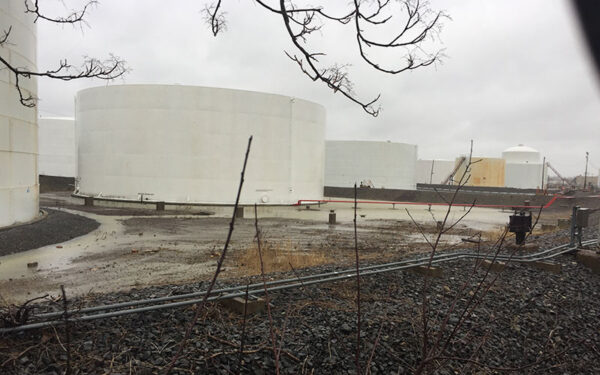
It may be hard to find hope in international, or even national, climate action – but we are making progress locally in New England. Photo: Shutterstock
Climate change, climate crisis, climate emergency. As a climate advocate, these words are always front of mind – but never more so than in the last few months. Right on the tails of screaming headlines and vivid pictures of wildfires, floods, drought, and extreme storms, United Nations scientists released a climate report declaring a “code red for humanity.” So, this year’s global climate conference in Glasgow arrived after even greater anticipation than usual.
With the recent science telling us that the next nine years are critical to avoiding irreversible and costly damage, I expected countries to come together with a shared purpose and deliver real action.
Except they didn’t. Real progress didn’t happen. And when the conference ended, I was disappointed and frustrated.
While there were some gains, the global conference was truly a missed opportunity. It also serves as a stark reminder that a central failure of leadership in Glasgow and our own Congress stymies the bold climate action our world needs.
But that won’t stop us. It just means that local progress is more important than ever – with states and regions like New England leading the way. Here are my top takeaways from this year’s conference.
1. The Climate Conference Provided a Front Seat to Inequity in Action
In 1992 (at the Earth Summit), global leaders agreed that a few developed countries were responsible for a majority of climate-damaging emissions. They also agreed that the impacts of those emissions – rising seas, extreme weather, high heat – would fall hardest on developing countries. Despite this acknowledgment nearly three decades ago, we still see those most vulnerable to the crisis neglected and left behind. This year’s conference was no exception.
First, there was the decision to host the conference in person during a global pandemic. Because of disparities in vaccine access – meaning some countries had poor or no access to the COVID-19 vaccine – many nations couldn’t attend in person. It’s no surprise that those most affected by this injustice were developing nations. Their absence left a void at the conference’s negotiating tables.
It hardly seems a coincidence, then, that the global conference made no progress on the issue of reparations to developing nations. Given that these countries are least responsible for the climate crisis, these reparations would have compensated them for the decades of hardship and destruction they have faced.
2. The Same Old Stalemates Inhibit Bolder Action
When countries ignore each other’s concerns, the potential for agreement on a unified global direction evaporates. For example, this year, developed countries demanded that developing nations phase out coal.
But why would developing nations concede on coal (which is the cheapest source of fuel in countries such as India) when their requests – including for reparations – were ignored? In the end, conference attendees agreed to “phase down” rather than “phase out” coal – another disappointing outcome.
Such stalemates persisted throughout the climate conference, inhibiting progress and agreement – and showing us how complicated it is to make headway on climate action internationally.
3. When We Do Agree, We Fail to Meet Our Promises
The failure of developed countries to uphold their past commitments further hampered global progress. The most obvious example? The world is quickly spiraling towards 2-degree Celsius warming instead of the 1.5-degree limit all but two countries agreed to via the 2015 Paris Agreement.
The $100 billion annual funding pledge is another broken promise. Made in 2009, the pledge promised to distribute $100 billion every year to developing nations by 2020 to fund efforts to withstand climate impacts and reduce polluting emissions. Yet, in 11 years, the pledge has never been met. Even the United Nations claimed this year that the target was out of reach.
4. Unfortunately, National Climate Action Also Lags Behind
Let’s face it, failures of climate action internationally are mirrored here in our own country. Although the United States rejoined the Paris Agreement (having pulled out during the Trump administration), meaningful climate legislation faces mounting barriers and obstacles. The ongoing challenges with the Budget Reconciliation bill reflect the difficulties associated with moving meaningful climate programs on the national level.
And even when we do make climate commitments, it seems our actions undermine our words. Just days after boasting of our commitment to slowing the emergency at the climate conference, President Biden and the Interior Department oversaw the largest oil and gas lease sales in U.S. history – delivering more dirty fuels and their pollution into our climate and warming our world.
What Comes Next? Look Local
Despite the rather discouraging report from the Glasgow conference, I want to be clear: We are making progress in curbing carbon pollution here in New England. Five of our states now have binding climate laws in place, mandating cuts in climate-warming emissions. And should state governments fail to implement these laws, we stand ready to enforce them. If we have to, CLF will compel them to act in court. But we hope that won’t be necessary. That’s why we and our allies are hard at work pushing states to fully implement these mandates through new laws and regulations.
New England as a region is leading the country in tackling the climate crisis thanks to these climate policies and laws. Our states can serve as a national model for the urgent action we need to slash emissions nationwide.
CLF and our allies could not have made such progress without the support of our members and constituents making calls, writing letters, and making your voices heard. We can find hope in what we’ve done and what we can do in the future – together.
So, as we break through the thick fog of Glasgow’s disappointment and national frustrations, don’t forget the power of our multi-state movement. We don’t have to wait for international action to protect the people and world around us.



